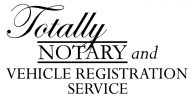Besides the document that requires notarization, you’ll need identification so the notary can certify your identity as the signer and the notarial fee.
Documents
Any document that requires notarization can be executed by the notary, but some have special requirements:
Out of State real estate documents
Recordable documents that transfer property (Deed of Trust, Mortgage, Grant Deed, Quitclaim Deed, Warranty Deed, etc) located in Connecticut, Florida, Georgia, Louisianna or South Carolina have witness requirements in addition to the notarial requirement.
- Connecticut requires two witnesses (one may be the notary)
- Florida requires two witnesses (one may be the notary)
- Georgia requires one witness (it cannot be the notary)
- Louisianna requires two witnesses (neither can be the notary)
- South Carolina requires two witnesses (one can be the notary) The witness must also witness the notary’s signature in the acknowledgment / jurat certificate of the Deed of Trust / Mortgage even if there is no witness line.
- Vermont requires one witness (it cannot be the notary)
Who can be a witness?
The witness is an additional person over the age of 18 that is not party to the transaction and is present to witness the signing of the document.
If your document has a signature line designated for a witness, it is recommended to call the originator of the document to get clarification on what they require.
Identification
In California, “Identity is established if the notary public is presented with satisfactory evidence of the signer’s identity”. (Civil Code section 1185(a)).
The State of California 2014 Notary Handbook:
http://www.sos.ca.gov/business/notary/forms/notary-handbook-2014.pdf
The most common forms of identification:
- An ID card or driver license issued by the State of California Department of Motor Vehicles
- A United States passport
Also accepted provided it contains a photograph, description, signature and identifying number of the signer:
- An inmate identification card issued by the California Department of Corrections and Rehabilitation, if the inmate is in custody in California state prison
- A passport issued by a foreign government, provided it has been stamped by the U.S. Immigration and Naturalization Service or the U.S. Citizenship and Immigration Services;
- A driver’s license issued by another state or by a Canadian or Mexican public agency
- An ID card issued by another state
- A U.S. military ID card
- An employee ID card issued by an agency or office of the State of California, or an agency or office of a city, county, or city and county in California.
Notarial Fee
In California, the fee a notary may charge is regulated by the state. It is currently set at a maximum of $10.00 per notarized signature.
©2014 Totally Notary All Rights Reserved


Leave A Comment